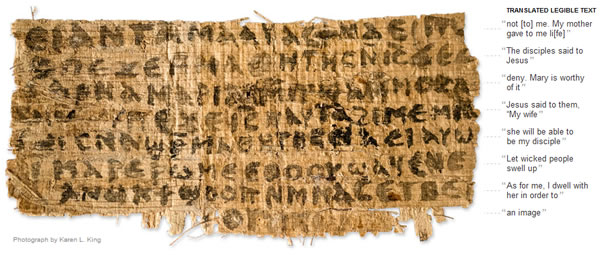Quite an interesting article in the Harvard Gazette:
Four words on a previously unknown papyrus fragment provide the first evidence that some early Christians believed Jesus had been married, Harvard Professor Karen King told the 10th International Congress of Coptic Studies today.More at the link, where there is also a video of Karen King, the Hollis Professor of Divinity at Harvard Divinity School, discussing the authenticity and interpretation of the papyrus fragment. It's worth emphasizing that this item does not prove Jesus was married; it proves that some early Christians thought he was married.
King, the Hollis Professor of Divinity at Harvard Divinity School, announced the existence of the ancient text at the congress’ meeting, held every four years and hosted this year by the Vatican’s Institutum Patristicum Augustinianum in Rome. The four words that appear on the fragment translate to “Jesus said to them, my wife.” The words, written in Coptic, a language of Egyptian Christians, are on a papyrus fragment of about one and a half inches by three inches.
“Christian tradition has long held that Jesus was not married, even though no reliable historical evidence exists to support that claim,” King said. “This new gospel doesn’t prove that Jesus was married, but it tells us that the whole question only came up as part of vociferous debates about sexuality and marriage. From the very beginning, Christians disagreed about whether it was better not to marry, but it was over a century after Jesus’ death before they began appealing to Jesus’ marital status to support their positions.”..
The gospel of which the fragment is but a small part, which King and Luijendijk have named the Gospel of Jesus’ Wife for reference purposes, was probably originally written in Greek, the two professors said, and only later translated into Coptic for use among congregations of Coptic-speaking Christians. King dated the time it was written to the second half of the second century because it shows close connections to other newly discovered gospels written at that time, especially the Gospel of Thomas, the Gospel of Mary, and the Gospel of Philip...
The Gospel of Jesus’ Wife, if it was originally written in the late second century, suggests that the whole question of Jesus’ marital status only came up over a century after Jesus died as part of vociferous debates about sexuality and marriage, King said. King noted that contemporary debates over celibate clergy, the roles of women, sexuality, and marriage demonstrate that the issues were far from resolved.
“The discovery of this new gospel,” King said, “offers an occasion to rethink what we thought we knew by asking what role claims about Jesus’ marital status played historically in early Christian controversies over marriage, celibacy, and family. Christian tradition preserved only those voices that claimed Jesus never married. The Gospel of Jesus’ Wife now shows that some Christians thought otherwise.”

Laurie Goodstein of The New York Times reports:
The faded papyrus fragment is smaller than a business card, with eight lines on one side, in black ink legible under a magnifying glass. Just below the line about Jesus having a wife, the papyrus includes a second provocative clause that purportedly says, “she will be able to be my disciple.”
The finding was made public in Rome on Tuesday at the International Congress of Coptic Studies by Karen L. King, a historian who has published several books about new Gospel discoveries and is the first woman to hold the nation’s oldest endowed chair, the Hollis professor of divinity.
The provenance of the papyrus fragment is a mystery, and its owner has asked to remain anonymous. Until Tuesday, Dr. King had shown the fragment to only a small circle of experts in papyrology and Coptic linguistics, who concluded that it is most likely not a forgery.


No comments:
Post a Comment